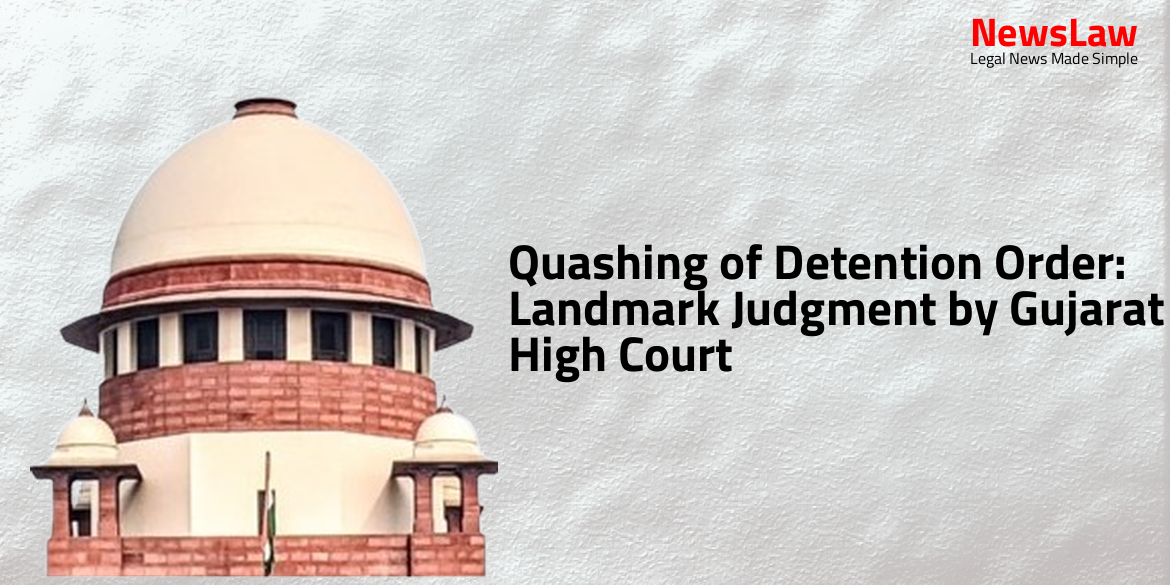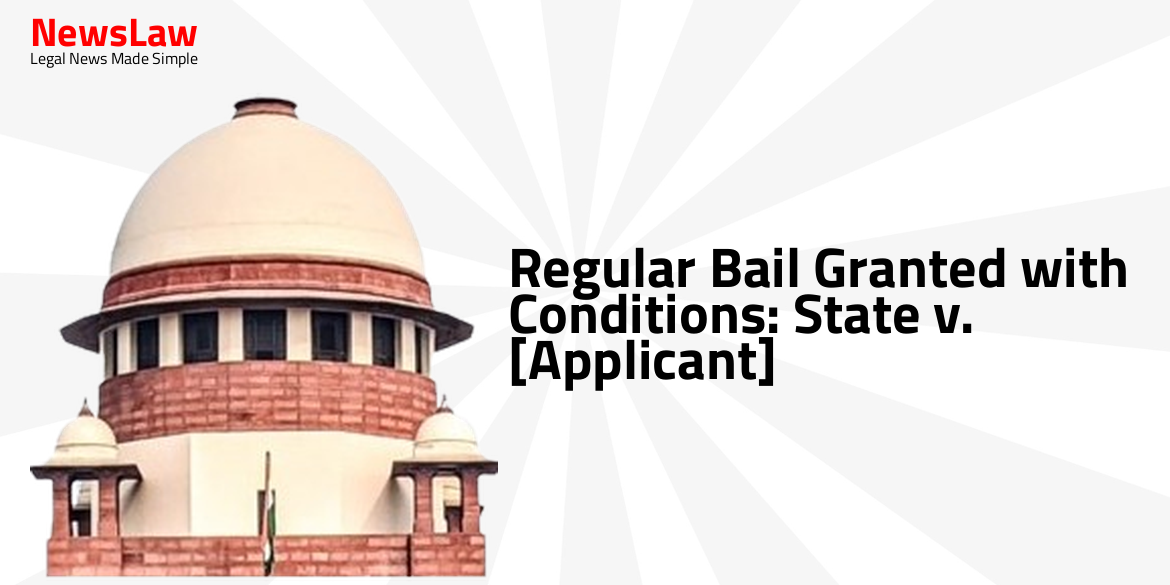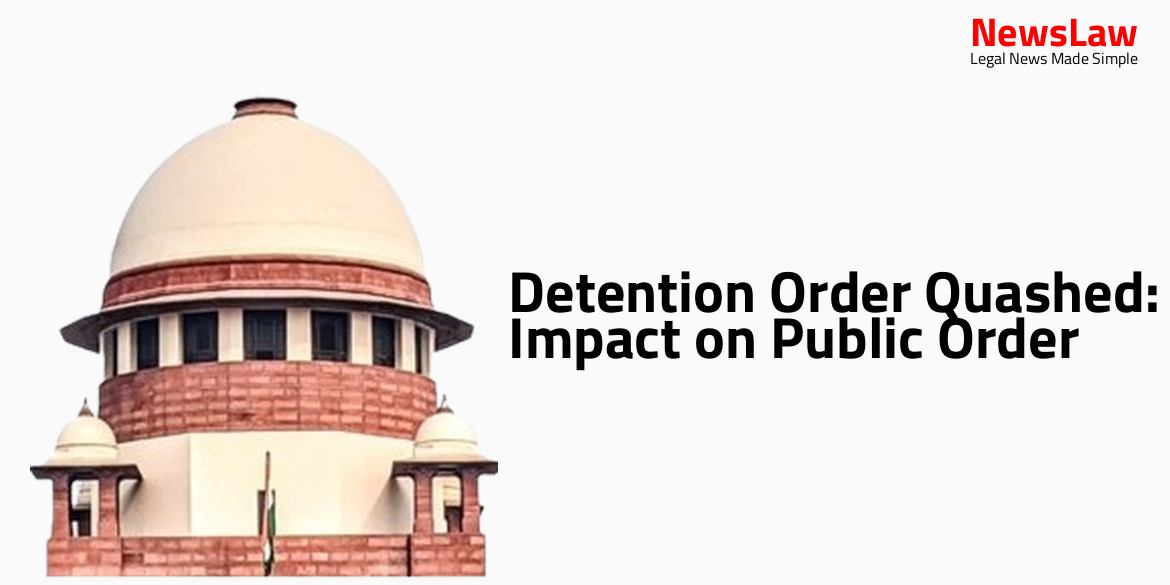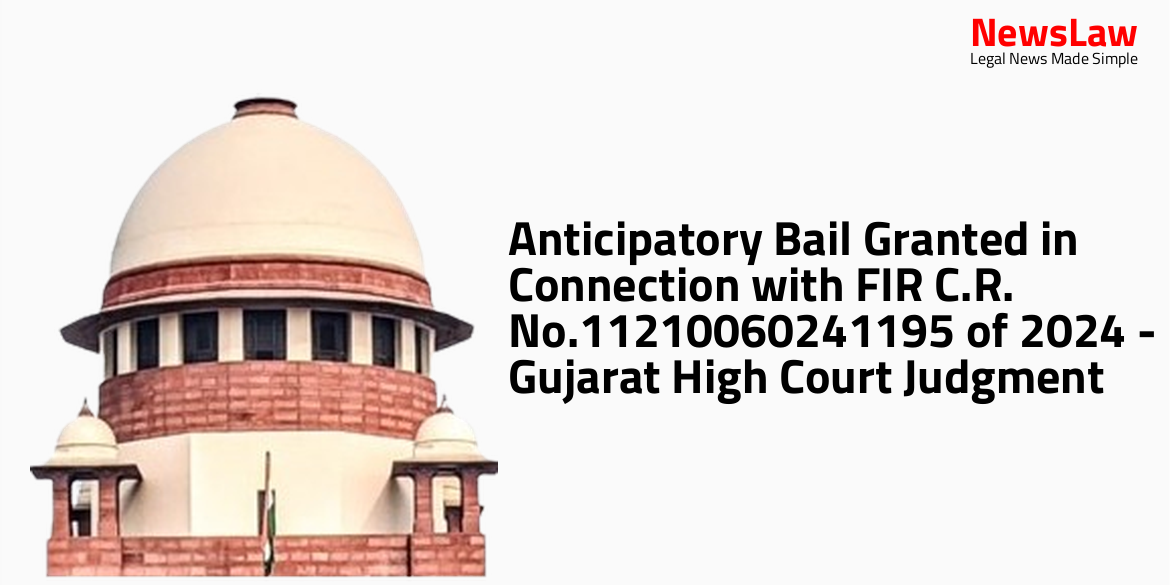In a significant verdict, the Gujarat High Court has quashed the detention order dated 11.01.2024 under the Gujarat Prevention of Anti-Social Activities Act, 1985. The case highlighted the importance of personal liberty and adherence to established legal procedures. The judgment, which led to the immediate release of the detenue, emphasized the distinction between disturbance to ‘law and order’ and ‘public order’ as outlined in the landmark case of Dr. Ram Manohar Lohia vs. State of Bihar.
Facts
- The present petition challenges the order of detention dated 11.01.2024 under the Gujarat Prevention of Anti-Social Activities Act, 1985.
- The detaining authority exercised powers under Section 3(1) of the Act to detain the petitioner.
- The petitioner is defined as a detenue under Section 2(c) of the Act.
Issue
- The issue involves the interpretation of Article X of the Constitution of India.
- The primary contention is whether the action of Party A is in violation of Article X.
- The crux of the matter lies in determining the scope and application of Article X in the present scenario.
- Several precedents and legal provisions have been cited by both sides to support their arguments.
- The decision on this issue will have far-reaching implications on similar cases in the future.
Arguments
- The learned advocate representing the petitioner – detenue argued that the impugned order of detention should be quashed as it was based solely on the registration of two FIRs for specific offenses under the Indian Penal Code.
- The advocate emphasized that the alleged illegal activities of the petitioner do not have any connection to the maintenance of public order, rather they could be categorized as a breach of law and order.
- It was pointed out that besides the FIRs and witness statements, there is no other substantial evidence linking the petitioner to activities threatening public order.
- Highlighting that the petitioner was already out on bail for all the offenses, it was argued that the detaining authority did not consider this crucial fact in their decision.
- The advocate concluded that based on the facts presented, it is not feasible to claim that the petitioner’s actions in the criminal cases disrupted the social fabric to an extent that posed a threat to public order.
- The detaining authority’s subjective satisfaction is found to be illegal and invalid as the alleged offenses in the FIRs do not impact public order.
- The allegations against the detenue do not fall under Section 2(c) of the Act as they are not relevant to disturbing public order.
- For a person to be detained under Section 2(c) of the Act, they must be proven to pose a threat to society causing a disturbance in public order, which is not evident in this case.
- There is a lack of specific material showing that the detenue’s actions are dangerous to public order.
- The Apex Court’s rulings on similar cases support the requirement of a genuine threat to public order for detention under the Act.
- The respondent State’s argument is based on materials from the investigation supplied to the detenue, indicating a pattern of behavior under Section 2(c) of the Act.
- The AGP argues that the detaining authority’s decision is valid considering the facts of the case.
Analysis
- The distinction between disturbance to ‘law and order’ and disturbance to ‘public order’ has been clearly settled by a Constitution Bench in the case of Dr. Ram Manohar Lohia vs. State of Bihar.
- A mere disturbance of law and order leading to disorder is not necessarily sufficient for action under the Defence of India Act but disturbances which subvert the public order are.
- In the case of K. Nageswara Naidu vs. Collector and District Magistrate, Kadapa, it was reiterated that minor breaches of peace primarily injuring specific individuals do not constitute disturbances to public order.
- Recent decisions by the Apex Court have highlighted the routine and unjustified use of Preventive Detention Laws in Telangana, emphasizing the need for evaluation of fairness in detention orders.
- The Apex Court has emphasized that preventive detention should not be a substitute for ordinary law enforcement and investigations, and detentions under this law are only for a limited period, not for perpetual custody without trial.
- The judgment discusses the importance of personal liberty protected under Article 21 of the Constitution.
- It emphasizes that the detaining authority must ensure that any detention strictly follows the established legal procedures.
- The court acknowledges that mere registration of FIRs does not necessarily indicate a breach of public order, therefore, it cannot be the basis for invoking detention powers under the Act.
- The impugned order of detention dated 11.01.2024 is quashed and set aside, leading to the immediate release of the petitioner – detenue.
- A District Magistrate is authorized to act against the subversion of public order, not solely for maintaining law and order.
- The concept of three concentric circles representing law and order, public order, and security of the State is explained.
- The judgment notes the absence of any bail cancellation application by the State authorities in the case.
- Article 22 is discussed in relation to Article 21, highlighting the former as an exception to the latter.
Case Title: SUNILSINGH S/O ARJUNSINGH @ PANSINGH @ TUFANSINGH BAVRI THROUGH RATANKAUR W/O TUFANSINGH SARDAR Vs. STATE OF GUJARAT
Case Number: R/SCA/1838/2024



